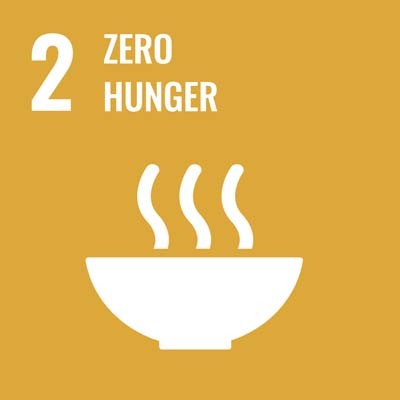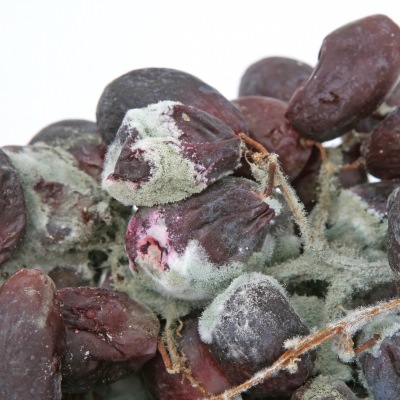The second Sustainable Development Goal is to end hunger, achieve food security and improved nutrition and promote sustainable agriculture.
2022 progress report
Cranfield is a passionate and frequent contributor to the Food Waste-Food Security Debate. Our actions in the last year supporting a Food Waste Week, waste food recycling, food banks and sustainable sourcing are outlined in the Annual Environmental Report.
Policy
We have introduced a new sustainable food policy. We aim to ensure that ingredients are sustainably sourced, using organic produce over conventional produce wherever possible.
Food waste
Food waste from our Cranfield campus catering outlets, student accommodation and office kitchens is separated from general waste and taken to an anaerobic digestion plant off site. The plant produces organic fertiliser which is used on growing crops, and methane which is converted, via a generator, into electricity for the National Grid and to power the plant. Find out more on our waste and recycling page.
We are proud members of the ‘Too Good To Go’ food waste movement. Too Good To go is an app that allows unsold food from selected venues on campus a second chance at being consumed rather than going to waste, allowing staff, students and the local community to purchase ‘surprise bags’ of food at low prices.
Food choices for sustainability
We are dedicated to nurturing the wellbeing of our community by providing health-conscious and affordable food choices. By adhering to a range of these principles, for example, increasing consumption of vegetables, leaner meat, use of cooking oils we create an environment that supports healthy living and empowers our community to make informed decisions about their dietary preferences.
Education
The Environment and Agrifood Theme combines research groups with 50+ years of experience in contributing to societal challenges such as sustainability, enhancing natural capital and future global food systems resilience.
Research
Examples of research contributing to this SDG included:
- Co-Production of Healthy, Sustainable Food Systems for Disadvantaged Communities
The project aims to provide citizens of socio-culturally adverse disadvantaged communities with choice over the food they consume. - Spray-on polymer to cut food waste and increase incomes for Kenyan smallholders
Spraying a safe and environmentally friendly polymer onto soil surfaces can reduce the ‘soiling’ of fine beans by almost 65 per cent. - NutriNuts
This project aims to mitigate the occurrence of aflatoxins in Ethiopian peanuts used in therapeutic food products to reduce malnutrition in Africa.
Outreach
‘Can You Dig It?’ – the Rurban Revolution team created a public engagement space at the popular Glastonbury festival designed to share knowledge about urban food growing through a range of interactive activities.
The Horticulture and Food Loss Network aims to improve crop quantity and output whilst reducing food loss and waste. The Network is jointly led by Cranfield University and the University of Reading.
2021 progress report
We have a range of courses related to food sustainability, listed on this page.
Cranfield is a passionate and frequent contributor to the Food Waste-Food Security Debate.
Our actions supporting a Food Waste Week, waste food recycling, food banks and sustainable sourcing are outlined in our Annual Environmental Report.
Our African Centre of Excellence for Sustainable Cooling and Cold-Chain (ACES), based in Rwanda, is helping to get food to markets quickly and efficiently. It will support farmers and fisheries in Africa to reduce the amount of food produced for human consumption which is lost due to poor post-harvest practices and handling – tackling hunger, under-nutrition, and environmental impacts, while boosting profits and creating jobs.
Courses/modules relating to the goal
The following courses either address sustainability entirely or contain modules that are focused on sustainability-related topics.
Applied Bioinformatics MSc
Executive MBA
Food Systems and Management MSc
Future Food Sustainability MSc
Global Environmental Change MSc
Management and Corporate Sustainability MSc
Management and Leadership MSc
Management MSc
MBA
Sustainability MSc

